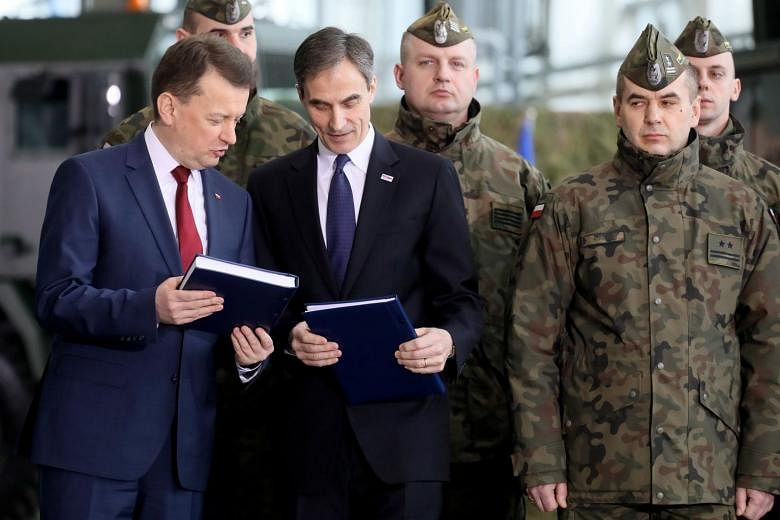WARSAW (REUTERS) - Poland signed the largest arms procurement deal in its history on Wednesday (March 28), agreeing with the United States to buy Raytheon Co's Patriot missile defence system for US$4.75 billion in a major step to modernise its forces against a bolder Russia.
"It is an extraordinary, historic moment; it is Poland's introduction into a whole new world of state-of-the-art technology, modern weaponry, and defensive means," President Andrzej Duda said during the signing ceremony.
NATO member Poland has accelerated efforts to overhaul its ageing weaponry following Moscow's annexation of Ukraine's Crimea peninsula in 2014 and the resurgence of Russian military and political assertiveness towards its neighbours.
Two-thirds of Polish weaponry dates from the 20th century Cold War era when the country was in the Soviet-led Warsaw Pact.
Russian officials were not immediately available to comment.
Deputy Foreign Minister Vladimir Titov told the state-run Sputnik news website in November that Patriot deployments were part of a US plot to surround Russia with missile defence systems "under the pretext of mythical threats to security".
The Patriot deal follows Monday's expulsion of more than 100 Russian diplomats by the United States and a score of other Western countries including Poland in response to a nerve toxin attack on a former Russian spy in Britain, the most sweeping action against Moscow since the heights of the Cold War.
This month, Russian President Vladimir Putin unveiled an array of new nuclear weapons, saying they could hit almost any point in the world and evade a US-built missile shield.
The Patriot deal came as a relief for Poland amid a rise in tension with Washington, its main NATO ally, over legislation that Warsaw introduced in January to impose jail terms for any suggestion of Poland's complicity in the Nazi Holocaust.
The United States says the bill subverts freedom of speech and Israeli officials say it amounts to Holocaust denial, an accusation that Poland's nationalist-minded government rejects.
Polish Prime Minister Mateusz Morawiecki said the Patriot agreement showed "solidarity and cooperation" with the United States and other NATO countries. "We, through our activities, our procurements, show that we want to feel an integral part of this most important military alliance," he said.
'STRONGER THAN OTHERS'
Wednesday's deal is for the delivery in 2022 of two Patriot system batteries manufactured by Raytheon, each coming with two fire units consisting of one sector AN/MPQ-65 radar and four M903 launchers.
Warsaw is negotiating with Washington to buy more Patriot systems, a new 360-degree radar and a low-cost interceptor missile as part of a second phase of military modernisation.
"We do expect that Poland will move pretty quickly with Phase II. They have a stated desire to complete that by the end of the year," Wes Kremer, president of Raytheon Integrated Defense Systems, told Reuters by telephone ahead of the signing.
Air defences are particularly crucial for Poland and neighbouring Baltic states Lithuania, Latvia and Estonia - former Soviet republics that are now NATO member states.
NATO planners say Russia is using its Baltic enclave of Kaliningrad as well as Crimea to pursue what is known as an "anti-access/area denial (A2/AD) strategy", with surface-to-air missiles to block off NATO's air access, if needed, to the Baltic states, about a third of Poland and to the Black Sea.
Warsaw's decision may raise pressure on Washington to meet Baltic requests for stronger air defences. While the Baltics are seeking their own missile defences, the high cost for their small economies makes any quick purchases difficult.
Raytheon's Kremer said the current threat environment had increased demand for missile defence systems and US President Donald Trump's administration was working hard to accelerate sales of such weapons to allied countries.
"In general, they're more open to expediting and getting these deals worked," Kremer said.
Fourteen other countries, including six NATO members, have the Patriot missile systems. Romania agreed in November to buy Patriots and the US government has also approved the sale of the weapons system to Sweden.
Poland's deal, approved in November by the US State Department, envisaged a sale worth up to US$10.5 billion. But Warsaw has been able to bring the price down by opting for a less ambitious IBCS (Integrated Air and Missile Defense Battle Command System) and procuring some elements locally.
"We are getting to the front row of countries which will be able not only to cooperate and jointly carry out tasks with the United States and NATO, but will be also perceived on (NATO's) eastern flank as ...stronger than others," General Leszek Surawski, the Polish military's chief of staff, told reporters after the signing ceremony.

